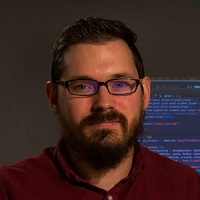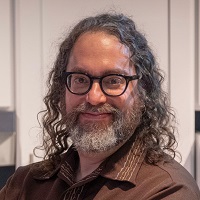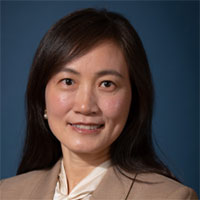Meet Some of WPI’s Newest Tenured Faculty
Department(s):
Alumni 
Lane Harrison has been awarded tenure and promoted to associate professor in the Department of Computer Science. Harrison is an expert in visualization and human-computer interaction, teaching courses in data visualization and web development. His research leverages computational methods to understand and shape how people interpret, use, and create visualizations and visual analytics tools. Harrison’s work has led to design guidelines for visualizations in cybersecurity, news, and education. He participates in WPI’s Data Science, Interactive Media and Game Development (IMGD), and Bioinformatics and Computational Biology programs. Harrison joined the faculty in 2015. He earned his BS and PhD at the University of North Carolina at Charlotte, and he completed postdoctoral work at Tufts University.
Q: What was the biggest ‘discovery’ during the promotion process? Was there something you uncovered in the course of your work that was completely unexpected?
A: In the field of data visualization, the 2010s were really defined by the rise of data journalism. For me, this brought to mind questions of data literacy: how can we know if general audiences are picking up on the trends and patterns authors are trying to communicate in their pieces?
In our studies investigating interactive visualizations on the web, what was unexpected was just how easily peoples’ experience of a given visualization could be shaped with seemingly minor design changes. Findings like this underscore the need for a broader range of experiments as well as scalable, measurable approaches for assessing and improving data literacy.
Q: The process for gaining tenure is often considered a gauntlet. What will you do with your time now? Is there a next project that you’re very excited about?
A: Well, if we’ve learned one thing from Gauntlet, the 1985 multiplayer Atari game, it’s that having a good team makes all the difference. I’m thankful for the fantastic graduate and undergraduate students I’ve worked alongside at WPI up to this point.
In the near term, I’m looking to grow our team so we can be better positioned to explore computational approaches for strengthening visualization literacy in the education space. One glance at the charts that middle schoolers are learning with tells us a lot about why data and visualization literacy has been such a challenge in the year of COVID.
Thinking longer term, I’m curious about the intersection of data science and work. How might small business owners and workers benefit when we make more sophisticated tools for data management, modeling, and analysis available to them?
Q: What do you enjoy most about WPI students and/or the WPI community?
Disciplinary boundaries melt away at WPI and it shows in the work that students produce. I’ve advised several interdisciplinary MQPs and I’m always struck at the positive results that come from bringing together faculty and students from different departments. It’s a special feature of the Institute.
Q: How will you reward yourself for this tremendous achievement?
A: Two things come to mind. First, I’ve learned that scotch is a nice means for warding off the chilly New England winters. I think a nice bottle is in order. Once the chill and the scotch are gone, I’m looking forward to finding some new routes to kayak this summer.

Joshua Rosenstock has been promoted to professor in the Department of Humanities and Arts. A faculty member since 2005 and tenured since 2011, Rosenstock was one of the university’s first art instructors and one of the first faculty members in the IMGD program. He teaches courses in digital art, artistic game development, interactive media, and electronic arts. He received WPI’s Romeo L. Moruzzi Young Faculty Award for Innovation in Undergraduate Education in 2008. His artwork has been exhibited and performed at venues including the Harvard Museum of Natural History, the Peabody Essex Museum, the Santa Fe International Biennial, and the Cabaret Voltaire. He earned his BS at Brown University and his MFA at the School of the Art Institute of Chicago.
Q: What does this promotion mean to you, personally and professionally?
A: I’ve always been somewhat of an outlier, professionally. I was the first studio art professor in WPI’s history. Even in my own field, the art that I make, such as my bio-artworks involving live organisms, often doesn’t fit into typical art categories and venues. Being promoted to full professor feels very gratifying and affirming as an acknowledgment by the Institute that the niche I have carved out both within WPI and in the wider scholarly world has enduring impact.
Q: What or who kept you inspired to forge ahead in applying for promotion?
A: My "Fermentophone" exhibition at the Harvard Museum of Natural History last spring was a career highlight and the culmination of many years of research and creative work. The fact that it was such a success made it feel like the time was right to apply for promotion.
Q: What do you enjoy most about WPI students and/or the WPI community?
A: I’m incredibly lucky to have been one of the core faculty of the Interactive Media and Game Development program for 15 years. I love working with my interdisciplinary colleagues and passionate students to develop interactive experiences using cutting-edge media tools.
Q: How will you reward yourself for this tremendous achievement?
A: I’d love to be able to celebrate together with my father, who also achieved full professorship and is my model for a life in academia. Sadly, he passed in 2018 so I can’t share the good news with him. However, my family celebrated as we do in COVID times, by ordering takeout from a fancy, delicious restaurant in my neighborhood.

Hong Susan Zhou has been promoted to professor in the Department of Chemical Engineering. As director of her microfluidics and bionanotechnology lab, Zhou focuses her research on microfabrication and nanotechnology for biomedical, energy, and environmental applications, with emphases on microfluidics and biosensors, biomaterials, and nanomaterials for fuel cell and biocatalytic applications. She has received NSF funding to use nanomaterial synthesis and nanostructure fabrication, microfluidics, and biosensors to develop a lab-on-a-chip for the detection of the infectious bacteria Clostridium difficile (C. diff). Zhou has taught a range of undergraduate and graduate courses since joining the faculty in 2005 and directs the Shanghai Project Center. She is a reviewer for more than 50 scientific and professional journals, serves on government grant proposal panels, and has organized and served as chair or co-chair on conference sessions. She was awarded tenure in 2012. Zhou earned her MS at Clarkson University and her PhD at the University of California, Irvine.
Q: What does this promotion mean to you, personally and professionally?
A: Being promoted to full professor is a major milestone for me in both my personal life and my professional career. I am delighted to be able to be a positive role model to my children, as this accomplishment reflects the culmination of years of perseverance and hard work. On a more personal note, seeing the excitement and pride on the faces of my loved ones when I broke the good news to them was so heartwarming. Professionally, this promotion is an important recognition of my qualities in teaching, scholarship, and service; looking ahead, I am ready for the challenge that I should infuse such teaching, scholarship, and service with the leadership role that accompanies the rank of a full professor.
Q: What or who kept you inspired to forge ahead in applying for promotion?
A: I am very grateful for the help and mentorship of my department chair Sue Roberts and my colleagues, on whom I have leaned heavily to get to this point in higher education. Sue frequently met with me on professional development plans, as I am involved with the Women Mentoring Group lunch organized by Sue where we talk about all the issues female faculties face, and I participated in the women associate professor development workshop led by Sue Roberts and Professor Chrys Demetry. Additionally, many colleagues of mine who have been promoted in recent years shared their success stories and portfolios with me, and I appreciate their time and openness to impart their experience.
Q: What do you enjoy most about WPI students and/or the WPI community?
A: Even though I have been at WPI for a long 15 years, the bright and intelligent student body never fails to impress me. I am humbled to be surrounded by such a wonderful community with so many talents and to be able to interact with WPI’s vibrant young students. I also very much enjoy the fine balance WPI strikes between offering a collaborative environment and cultivating individual development.
Q: How will you reward yourself for this tremendous achievement?
A: Although it is not possible at the moment due to the current circumstances in regards to the pandemic, I would love to bring my family on a vacation to celebrate this milestone.